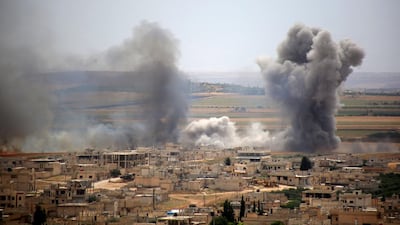The best hope for civilians ending a deadly government onslaught in Idlib is that Turkey and Russia eventually act on mutual interests to restore the ceasefire they brokered in Syria's last rebel-held province; the alternative is a bloody battle to the finish, according to a regional expert and a former rebel commander.
More than 300 civilians are estimated to have been killed and nearly 270,000 displaced since President Bashar Al Assad's forces launched their offensive in late April, with air support from his ally Russia. Civilian targets such as markets, schools and hospitals have been hit repeatedly.
"Despite the ferocity and unrelenting nature of the ongoing campaign on Idlib, I do not think it will end in the reconquest of Idlib by the Assad regimes and its allies. A deal still needs to be worked out between Turkey and Russia – and to a lesser extent, Iran and the Assad regime," said Elizabeth Tsurkov, a research fellow at the Forum for Regional Thinking specialising in Syria.
"Without such a deal, a regime reconquest of Idlib will result in mass displacement of residents of Idlib and Hama to areas under direct Turkish control [northern Aleppo province] and possibly into Turkey itself," Ms Tsurkov told The National. "Turkey wants to avoid this outcome at any cost – the main reason it directly intervened in Idlib is to avoid this scenario."
She expects the ceasefire that President Recep Tayyip Erdogan and his Russian counterpart Vladimir Putin agreed upon in September will be reinstated at some point, but for now Moscow finds itself "trying to navigate different pressures and interests at the same time".
"The regime is interested in retaking Idlib and the Russians want to push the rebels further away from Latakia to protect the Hmeimim base. At the same time, Russia wants to maintain a good relationship with Turkey," Ms Tsurkov said.
"I think the fact that the offensive has been continuing now for over a month is a result of breakdown in talks between Russia and Turkey."
Ahmad Rahal, a former colonel in the rebel Free Syrian Army (FSA), said intensity of the attack so far suggested that the bombing would intensify, with mounting civilian casualties, to swiftly gain territory in Idlib and strengthen Russia's bargaining position.
Russia now "is negotiating with Turkey via bombs and tanks"" he said.
"Astana and Sochi [peace processes] have died on the ground in spite of the denials from Turkey and Russia; however, Russia is the one who has chosen the military solution to expand their area of control," Mr Rahal told The National.
"But they are mistaken to think that their attacks will progress as it did in Aleppo or Ghouta, because the global actors will not stand silent."
He predicted that western countries including the United States would resume support for the rebels to prevent Russia and militias backed by Iran, Mr Al Assad's other main ally, from taking Idlib.
"Russia seems to ignore the fact that Idlib is the rebel’s last stronghold; their families have nowhere else to escape. So it will be a deadly battle which Russia will lose," he said.
Mr Tsurkov said Turkey also had military options to counter the government offensive and prevent Idlib being overrun, which would trigger the influx of refugees that it is trying to avoid. The possibility that these might include extremist fighters from Hayat Tahrir Al Sham, the dominant force in Idlib with links to Al Qaeda, would make such an outcome even more unacceptable.
"I think Turkey has a lot of cards it has not played yet that would allow it to slow down regime progress, but Turkey has not used most of these cards thus far, in part due to its desire not to antagonise Russia,' she said.
"Turkey could push additional fighters from Euphrates Shield factions to join the fight in Hama; it could supply even more weaponry to the opposition, particularly more anti-tank and possibly even anti-aircraft weapons. Finally, Turkey could intervene in the conflict directly.
"The prospect of millions of refugees streaming into Turkey, among them tens of thousands of jihadists, is unacceptable to Turkey. Therefore I expect Turkey to increase its involvement and support to the rebels in Idlib if it believes that the opposition is at risk of losing Idlib."

